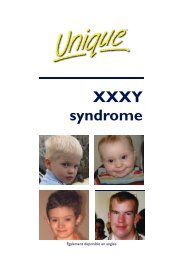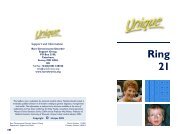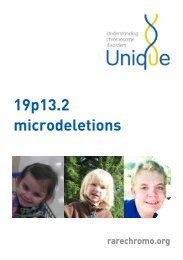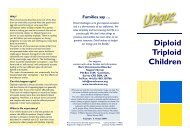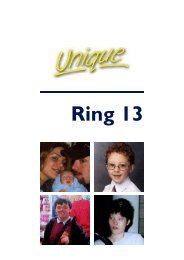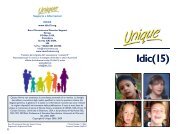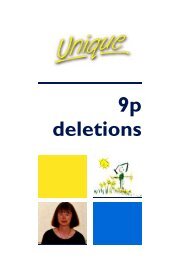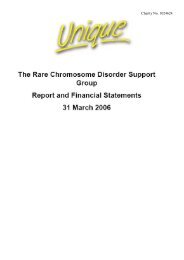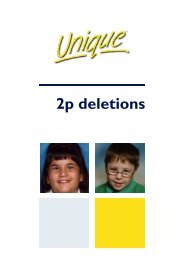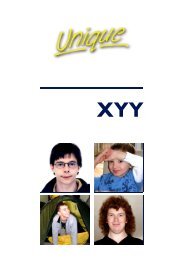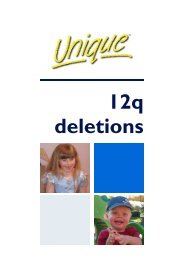18p deletions FTNW - Unique - The Rare Chromosome Disorder ...
18p deletions FTNW - Unique - The Rare Chromosome Disorder ...
18p deletions FTNW - Unique - The Rare Chromosome Disorder ...
Create successful ePaper yourself
Turn your PDF publications into a flip-book with our unique Google optimized e-Paper software.
Learning<br />
Learning difficulties are common in children with <strong>18p</strong>-. Most children have mild to<br />
moderate learning difficulties. However, a few children have no problems at all while a<br />
small minority have severe or profound learning disabilities and intellectual disabilities.<br />
<strong>The</strong> evidence from <strong>Unique</strong> reflects this variability. Around half of <strong>Unique</strong> children attend a<br />
special educational needs school. <strong>The</strong> remainder go to mainstream schools, some having<br />
1:1 help in the classroom or the benefits of a special needs unit attached to the school<br />
(<strong>Unique</strong>).<br />
Many, but not all, <strong>Unique</strong> children have mastered reading to some degree: some can<br />
recognise their name and some basic words; others love to read. Writing and drawing has<br />
also been achieved by the majority of children. <strong>The</strong> hypotonia and problems with fine<br />
motor skills can make writing difficult and many children find using a keyboard to write<br />
easier than a pencil or pen (<strong>Unique</strong>).<br />
<strong>The</strong> developmental psychologist at her 2-year assessment estimated that she is at<br />
least at her own age-level. 2 years<br />
Although he cannot speak he can spell out 50+ words; knows his numbers up to 100<br />
and above and can add simple numbers. 5 years<br />
He can recognise his name, Mummy, Daddy and other names. He can recognise and<br />
count to 20 and attempts the alphabet but cannot read a simple book. 6 years<br />
She’s always been a bright little button and has no learning difficulties aside from<br />
speech problems. Her memory is absolutely brilliant. 6½ years<br />
He can write his first and last name and the names of some friends and family. He<br />
can draw people and animals, although they are not always recognisable! 9 years<br />
She has a borderline learning disability and learned to read at 5 years and is now<br />
reading Oxford Tree Reading scheme level 10. 10½ years<br />
He is good at reading, spelling, science and maths. He is very good on a computer.<br />
He loves reading factual books. 11 years<br />
She is better with numbers than written English. She reads children’s books and<br />
has a reading age of 8-10 years. Even at 30 she still enjoys learning! 30 years<br />
This level of achievement will not be possible for all. A number of adults known to <strong>Unique</strong><br />
do not read or write. <strong>The</strong>re is variability in other skills as well. Many children, but not all,<br />
have an excellent memory and are good at retaining information.<br />
Many children have a reasonable attention span, whereas others have poor concentration<br />
and struggle to stay focused. For many children a lot of encouragement, praise,<br />
repetition and well-ordered routines are helpful for the learning process.<br />
Many parents report that it is important to make learning fun, visual and interactive. Most<br />
children seem to flourish when in a calm environment, in small groups and with 1:1 help<br />
(<strong>Unique</strong>).<br />
He is not reading yet but can match letters and numbers. He will attempt to draw<br />
circles and straight lines if encouraged. 6½ years<br />
He does not read yet but likes to draw buildings. 17 years<br />
8



